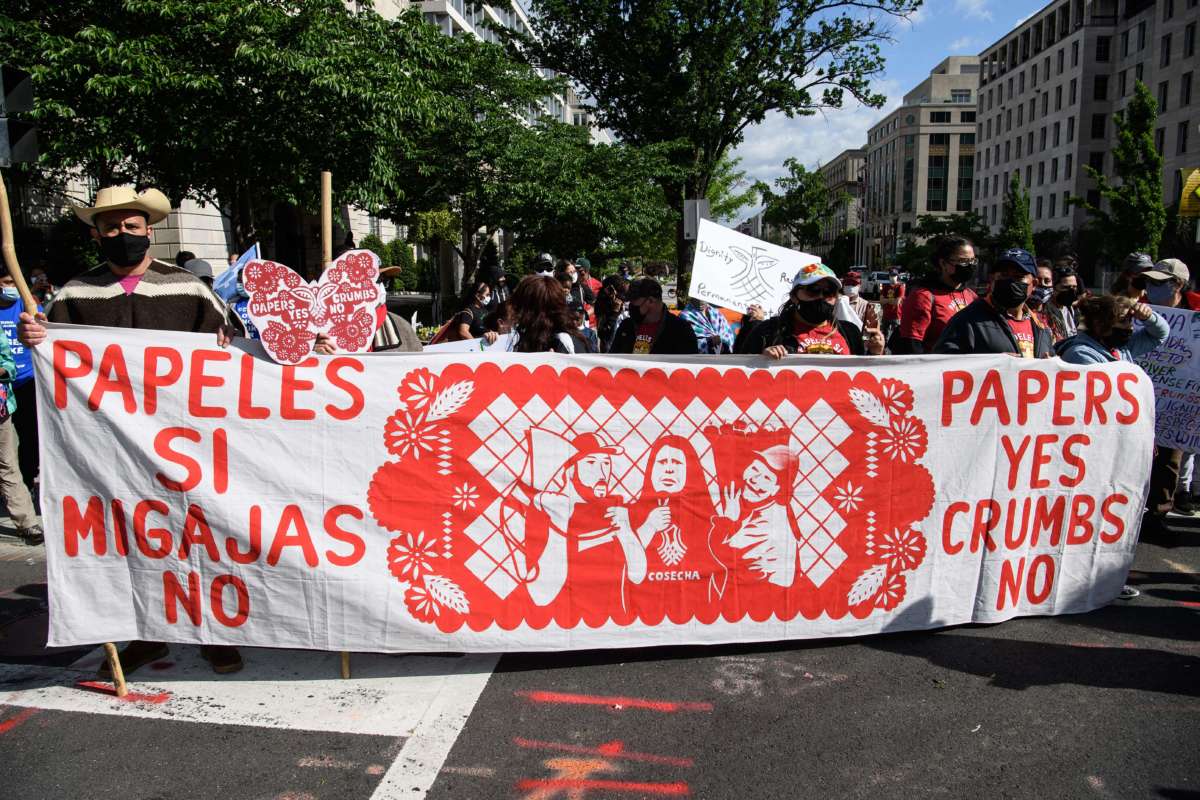Honest, paywall-free news is rare. Please support our boldly independent journalism with a donation of any size.
In a unanimous decision, the Supreme Court ruled on Monday that immigrants who entered the country illegally and have Temporary Protected Status (TPS) to stay in the U.S. cannot apply for permanent residency or a green card, as it’s typically called.
Over 400,000 immigrants in the U.S. currently have TPS, many of them from El Salvador. Earlier this year, Joe Biden’s administration opened up eligibility for the program to people from Haiti, Venezuela and Burma, meaning that hundreds of thousands of immigrants are now eligible.
TPS, a 30-year-old program, provides protection for immigrants from countries to which the U.S. has deemed it would be unsafe for them to return. President George Bush granted immigrants from El Salvador TPS in 2001 after earthquakes devastated the Central American country. Some residents who have been granted TPS have lived in the U.S. for decades and nearly 82,000 have been able to obtain green cards.
Jose Sanchez and Sonia Gonzales were the plaintiffs in the case, which questioned whether someone who entered the country illegally could be considered admitted because of their TPS status. Sanchez and Gonzales’s lawyer argued that admission is “inherent” in TPS. The couple came to the U.S. in the late 90s and have four children, one of whom was born in the States.
Some TPS holders have described the ability to get a green card as a lifeline that provides them crucial security in protecting their lives and the lives of their families.
“That threat of losing TPS further demonstrates why as many eligible TPS recipients as possible should be able to safely and quickly adjust their status to become permanent residents and eventually U.S. citizens,” wrote The Harvard Immigration and Refugee Clinical Program in March in a document submitted to the Supreme Court. “To many Harvard TPS recipients, the United States is also their home, and they desire to make their investments in this country permanent.”
In that document, Harvard custodian Julio Perez shared his story. He was able to receive his GED after moving to Boston, where he has spent over half of his life. “I hope I can still achieve my dreams of going to college,” he said. “Even [if] it will be the last days of my life, I want to have that privilege.”
For undocumented immigrats who have seen their lives debated and subjected to the whims of changing political adminitrations for decades, Monday’s ruling is a major blow.
“Today’s decision is not just a setback for those immigrants currently in Temporary Protected Status who did not enter the United States lawfully,” Steve Vladeck, CNN Supreme Court analyst, said. “It also reinforces the barriers that Dreamers would face until and unless Congress provides a statutory path to some kind of permanent lawful status.”
The Donald Trump administration had taken away protections for many of the countries that were previously considered protected under TPS and which are represented by nearly 98 percent of the immigrants protected under the program. Biden had restored those protections and added countries to the list, but immigrant advocates say he could do more.
The Biden administration has kept immigrants with TPS status in limbo — opening up TPS eligibility while still supporting restrictions on the ability of TPS holders to apply for green cards. This despite the fact that Biden promised to create pathways to citizenship on his first day in office with the U.S. Citizenship Act of 2021.
House Democrats recently passed a bill that would codify a pathway to citizenship for current TPS holders, but the bill hasn’t been taken up by the Senate.
Advocates called on Congress and the president to take action after Monday’s decision.
“Although this is a huge blow for one of the only available avenues for our families to adjust their status, this will not deter our struggle for obtaining green cards for all TPS holders,” said Claudia Lainez, a TPS holder and organizer for the National TPS Alliance in a statement. “This news only emphasizes the fact that [C]ongress must act now to guarantee permanent protections and for President Biden to expand the TPS status to everyone who deserves it.”
Speaking against the authoritarian crackdown
In the midst of a nationwide attack on civil liberties, Truthout urgently needs your help.
Journalism is a critical tool in the fight against Trump and his extremist agenda. The right wing knows this — that’s why they’ve taken over many legacy media publications.
But we won’t let truth be replaced by propaganda. As the Trump administration works to silence dissent, please support nonprofit independent journalism. Truthout is almost entirely funded by individual giving, so a one-time or monthly donation goes a long way. Click below to sustain our work.
